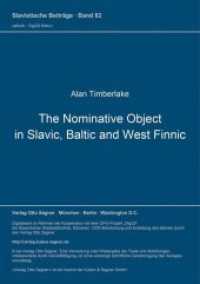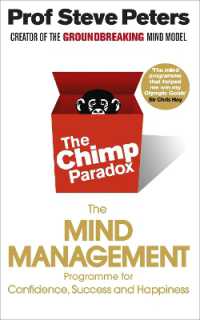- ホーム
- > 洋書
- > 英文書
- > Literary Criticism
Full Description
Explores Shakespeare's representation of the failure of democracy in ancient Rome Shakespeare and the Fall of the Roman Republic introduces Shakespeare as a historian of ancient Rome alongside figures such as Sallust, Cicero, St Augustine, Machiavelli, Gibbon, Hegel and Nietzsche. In Julius Caesar and Antony and Cleopatra, Shakespeare shows Rome's transition from Republic to Empire. Why did Rome degenerate into an autocracy? Alternating between ruthless competition, Stoicism, Epicureanism and self-indulgent fantasies, Rome as Shakespeare sees it is inevitably bound for civil war. Shakespeare and the Fall of the Roman Republic considers Shakespeare's place in the history of concepts of selfhood and reflects on his sympathy for Christianity, in light of his reception of medieval Biblical drama, as well as his allusions to the New Testament. Shakespeare's critique of Romanitas anticipates concerns about secularisation, individualism and liberalism shared by philosophers such as Hannah Arendt, Alasdair MacIntyre, Charles Taylor, Michael Sandel and Patrick Deneen.
Key Features:
Explains Shakespeare's interpretation of the underlying causes of the Roman Republican civil warsShows how Shakespeare uses Roman history as a testing-ground to arbitrate between competing claims about human natureArticulates Shakespeare's distinctive, compromise position on selfhoodSituates Shakespeare within the intellectual history of individualism, Christianity, Romanticism, secularization, and political liberalism
Contents
Dedication
Acknowledgments
Introduction: Shakespeare and the vulnerable self
Part I. Julius Caesar
Chapter 1. "A beast without a heart": Pietas and pity in Julius Caesar
Chapter 2. "The northern star": Constancy and passibility in Julius Caesar
Conclusion to Part 1: Shakespeare's Passion play
Part II. Antony and Cleopatra
Chapter 3. "The high Roman fashion": Suicide and Stoicism in Antony and Cleopatra
Chapter 4. "A spacious mirror": Interpellation and the other in Antony and Cleopatra
Conclusion to Part II: The last interpellation
Conclusion: Between humanism and antihumanism
Index








